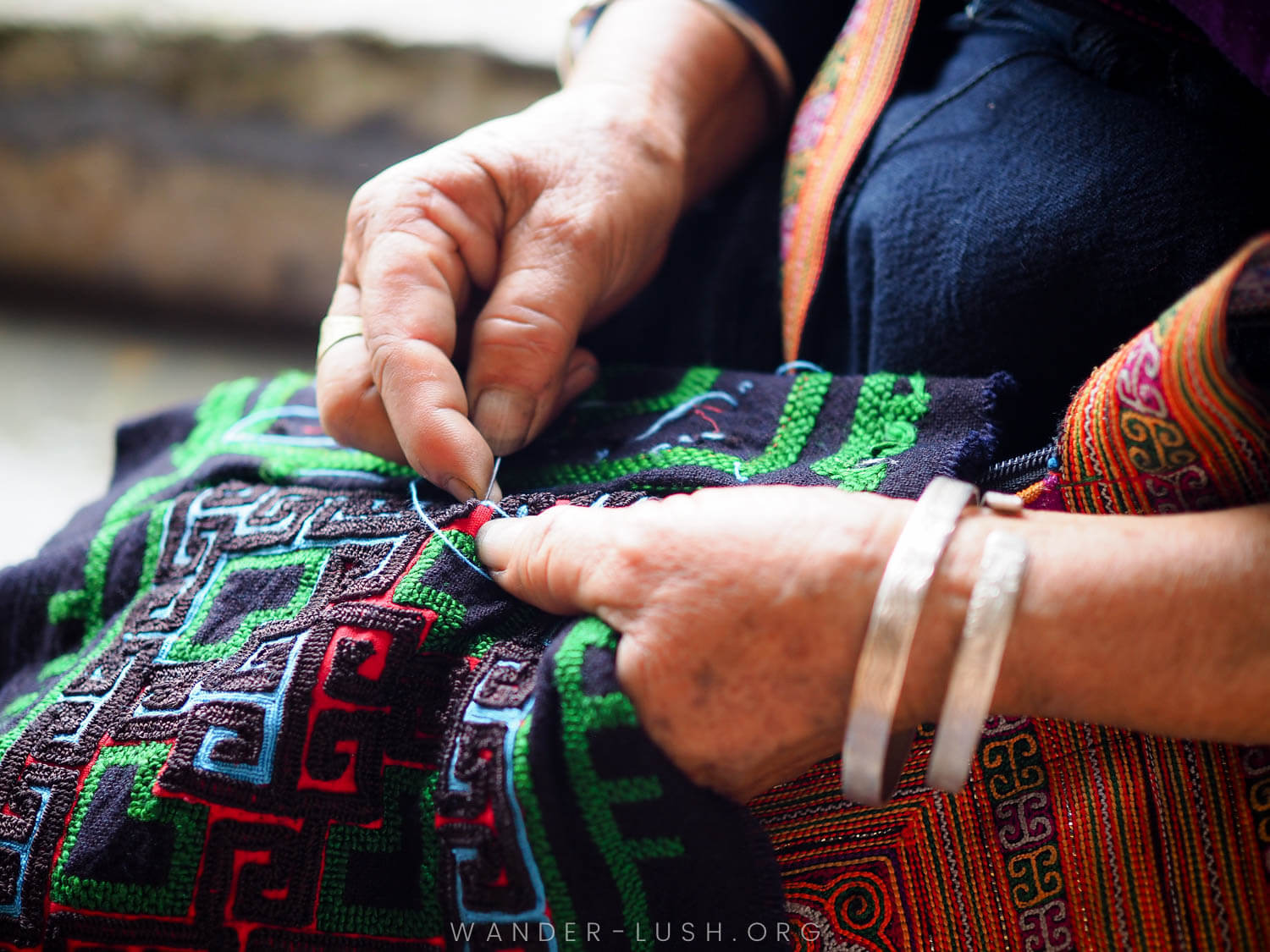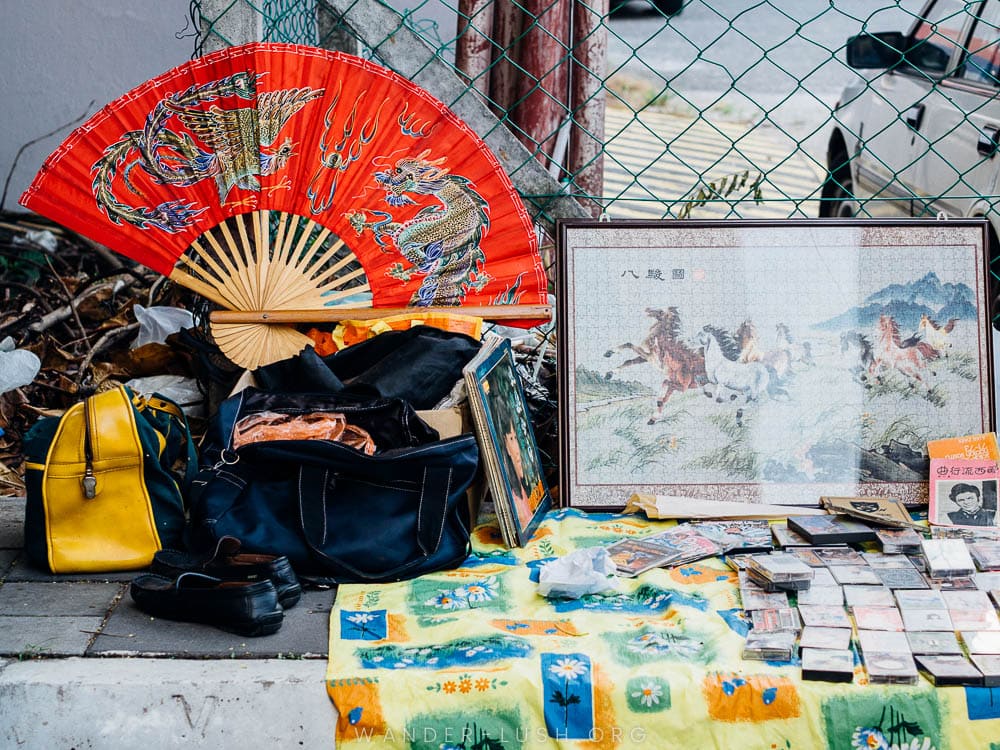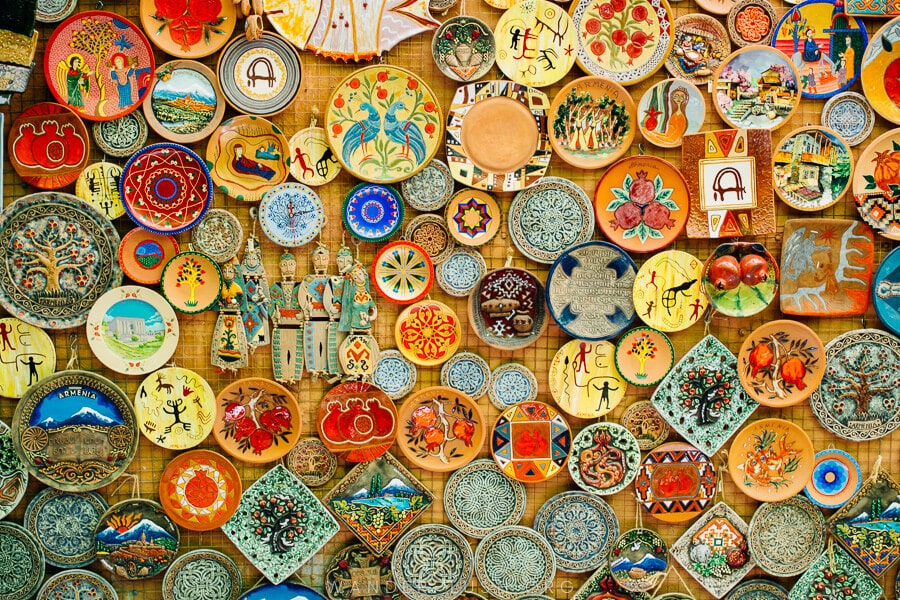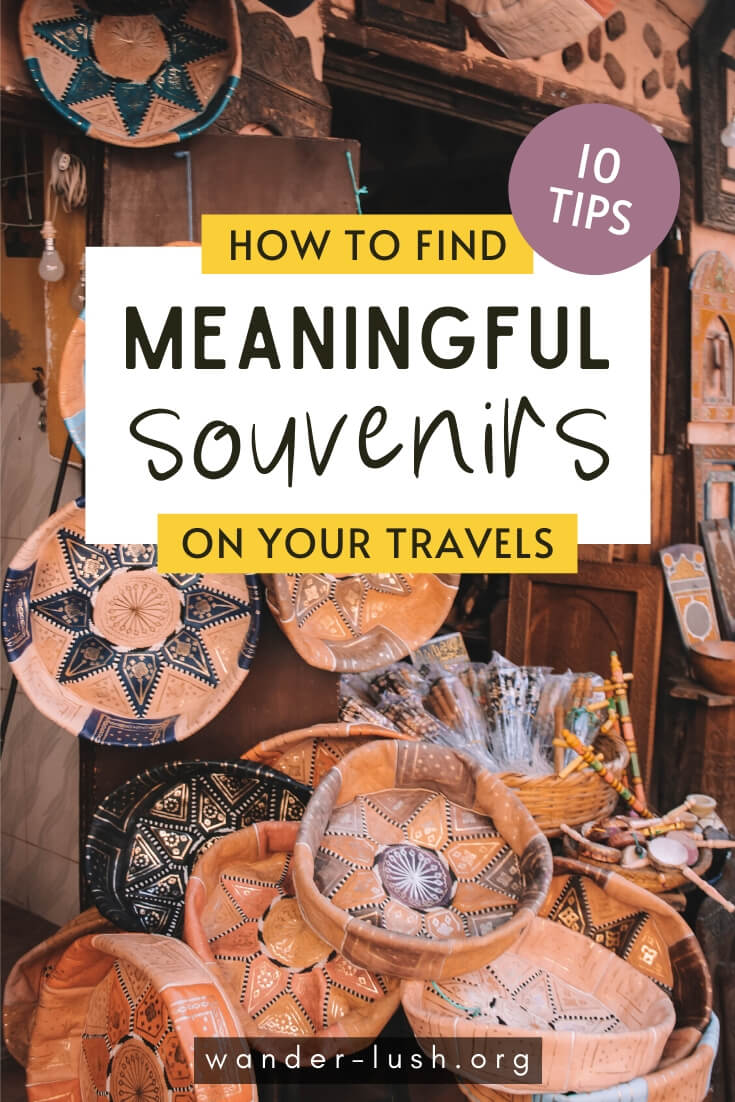Meaningful souvenirs that capture the spirit of a place and culture can last you a lifetime. Here are 10 practical tips for avoiding mass-produced mementos and finding handmade, ethical and authentic souvenirs on your travels.
I may be a minimalist traveller at heart, but I have a soft spot for beautiful, handmade souvenirs.
Textiles are my thing. Wherever I go, I always bring home a handmade wall hanging, carpet or tablecloth to add to my growing collection. My most-treasured souvenirs from five years of travel are a set of paintings from Yangon, a wooden box from Marrakesh, filigree jewellery from Kosovo, and a traditional Carriel bag made in Jerico, Colombia.
Like many long-term travellers, I always struggle to make room in my backpack for said textiles plus gifts for family back home. Over the years, I’ve had to learn (through a long process of trial and error – and yes, a few overweight luggage fees) to be very selective when buying souvenirs.
The sad reality is that majority of souvenirs made for tourists these days are low quality and mass-produced. Compared to my first trip to Southeast Asia back in 2012, handmade, authentic and ethical souvenirs have become far more difficult to find.
This is particularly true of night markets in Asia. But I now see the same trend towards cheap, ‘fast’ souvenirs almost everywhere I go.
In my everyday life, I write about and research ethical fashion and fair trade. This puts me in a good position to offer advice on this topic.
I was recently invited by Intrepid Travel to share my top tips for ethical shopping in Luang Prabang, Laos – and that got me thinking about ways to find meaningful souvenirs no matter where you’re travelling to.
Please note: This post contains affiliate links, meaning I may earn a commission if you make a purchase by clicking a link (at no extra cost to you). Learn more.

What makes a souvenir meaningful?
Mass-produced souvenirs don’t fit with my travel ethos at all. For me, the best souvenir is something that reminds you of a particular place and a particular time – so it follows that the object should have roots in the location where you found it.
What’s the use of buying a scarf made in a factory in China to recall your travels in Laos? It just doesn’t make sense to me.
‘Meaningful’ souvenirs are just that – objects that mean something to you. Ideally, they also mean something to the culture and to the person who made them.
When looking for souvenirs to buy, I have four criteria that I always consider:
- Is it made locally?
- Does it use local materials?
- Is it made ethically?
- Is it something I’ll use back home?
If you follow my souvenir buying ethos and focus on a few key items that meet these requirements, you’re surely save money and luggage space.
More than that, buying meaningful souvenirs is an easy way to support artists, small businesses and social enterprises, and thus give back to the local community.

10 tips for finding meaningful souvenirs
Here are 10 practical tips for finding meaningful, authentic, handmade and ethical souvenirs anywhere in the world.
1. Do you research before you arrive
If you want a souvenir that’s steeped in culture and significant to the place you’re visiting, it really pays to do some online research before you travel.
I don’t just mean consulting ‘top 10 souvenir’ lists, because those are often limited to popular, mass-produced souvenirs.
Instead, focus your research on traditional craft techniques and materials. Is organic hemp a specialty fabric? Is basket weaving part of the cultural heritage?
Within those categories, try to find out if there are any particular patterns, motifs or colourways that are important to the area. Oftentimes artisans tailor their designs to tourists’ tastes. That’s fine if the finished product resonates with you, but if you want something culturally significant, you might have to look beyond the regular shops and markets.
Objects such as textiles, woodwork and metalwork are often tied to local culture and customs. Taking the time to investigate their significance demonstrates respect beyond their aesthetic value. On a practical note, coming in with an idea of what you’re looking for will make the decision-making process much, much easier.
UNESCO’s list of Intangible Cultural Heritage is a great place to start researching artisan techniques and indigenous materials.
2. Avoid night markets & tourist traps
I love the atmosphere of a good night market, but it’s not where I choose to do my souvenir shopping. In Southeast Asia particularly, night markets have become the domain of tourists and are often overflowing with cheap, mass-produced ‘stuff’.
Even supposedly authentic markets such as the iconic Bac Ha in Northern Vietnam have lost much of their authenticity in recent years.
If you’ve travelled around Vietnam by bus, you’ll know it’s customary to stop at ‘souvenir shops’ on the highway from Hanoi to Halong Bay, for example. Again, these are usually tourist traps.
These are extreme examples, and I know I’m generalising here – there are of course many, many exceptions to this rule. Art and craft markets are often the best place to source souvenirs directly from the creator, and many cities have beautifully curated boutiques that are designed for tourists but still offer quality products.
Let common sense prevail. If you visit a market where the same items appear again and again – and it’s obvious that it’s made from synthetic materials – then those aren’t necessarily going to be the most meaningful souvenirs to take home with you.

3. Support social enterprises & ethical boutiques
Instead of souvenir shops, try seeking out social enterprises and ethical boutiques instead. Social enterprises that train and employ people, often those most disadvantaged in society, can be found all over the world. More often then not, they produce high-quality products. They also reinvest profits back into their communities.
A good example is Jennifer’s Hamam in Istanbul, a project that works with artisans to make hand-loomed Turkish bath towels. There are dozens of social enterprises in Hanoi, Phnom Penh, Kuala Lumpur, and other cities across Southeast Asia, each of them committed to supporting artisans and minimising their impact on the environment.
4. Go straight to the source
‘Handmade’ is a word that gets thrown around a lot these days. The easiest way to tell if something is truly made by hand is of course to see the process with your own eyes.
Do some digging around and no matter where in the world you are, you’ll find a chance to go direct to the workshop, studio or craft village. This allows you to observe the process and buy direct from artisans.
Artisans Angkor in Cambodia is a great example. In addition to their boutiques, they also offer short tours of their craft workshops and silk factory in Siem Reap. When I visited Amish Pennsylvania, I was told about a home workshop – I drove up to someone’s garage and bought an incredible hand-sewn quilt from the woman who made it.
5. Look for certification seals or symbols
Fair Trade Guaranteed or Certified, GOTS organic cotton FSC Certified wood – all of these marks are designed to help consumers identify products that are fairly made from sustainable materials. You might look for these symbols when you do your shopping at home – you can also use them to find meaningful souvenirs.
Certification isn’t the be all and end all, but it’s a pretty good indication that a company or brand has policies in place to protect its workers and the environment.
Some cities and regions have developed their own standards to promote artisans and safeguard cultural heritage. For example, Handmade Luang Prabang recognises makers who produce textiles and woodwork locally using endemic materials.

6. Join a culture-themed tour
Joining a food tour is a great way to understand a place’s culinary scene and get recommendations for where to eat local food. In the same vein, a culture-focused city tour can help you figure out what souvenirs to buy and where.
Urban Adventures offers a program of private and small-group tours that are specifically focused on locally made souvenirs. Itineraries range from market tours of Hong Kong (created in collaboration with Lonely Planet), to shopping tours of Bucharest, Romania and special edition tours, such as guided walks through Christmas markets.
7. Ask a local
The main benefit to joining a guided shopping tour is having a guide to give you their suggestions. Even if you don’t join a formal tour, it’s always worth asking a local to recommend meaningful souvenirs and their favourite shops.

8. Be prepared to pay a bit extra
When searching for meaningful souvenirs, it’s important to think in terms of quality over quantity. Something handmade is always going to be a bit more expensive than a factory made alternative.
Think of each souvenir or gift you buy as an investment piece. That way, you’re far less likely to gravitate towards cheap, poorly made items.
9. Take your time
The pressure to find the perfect souvenir and buy the ideal gifts for people back home can be intense, I know. But rushing to fill up your suitcase as quickly as possible is a sure-fire way to end up with whole bunch of stuff you don’t really want or need. Meaningful souvenirs take time to make – and they take time to track down, too.
Take your time to look around, not necessarily in search of the best bargain but rather to compare different designs and quality. If time permits, I try to visit a market several times before I commit to buy anything.
10. Only invest in something you’re going to use back home
Trinkets, ornaments and colourful knickknacks are fun, but how often are you actually going to use them?
If you buy a souvenir that you can integrate into your daily routine back at home, then you’re much more likely to hold onto it and cherish it into the future. If an item is crafted to serve a specific purpose (even if it’s just decorative), it’s much more likely to hold meaning.
A spice grinder from Istanbul, a set of shot glasses from Serbia, a printed tablecloth from Tbilisi – all of these items are beautiful, but they also serve a specific purpose and hold value to the culture they came from. To me, that makes them even more meaningful.

Meaningful souvenirs: Pin it
Check out my latest souvenir guides
- The best souvenirs from Colombia
- Where to do your shopping in Hanoi
- Where to find Malaysian souvenirs
- The best Cambodian souvenirs
- The best Georgian souvenirs in Tbilisi
- Authentic Armenian souvenirs
- The best Oman souvenirs
You made a good point when you mentioned buying something that serves you a purpose when you bring it back home so you won’t feel regret spending your money on it. My wife and I are thinking to go on a vacation next month since we have not had the chance to do so for quite some time as we both have been busy with our jobs. I think it would be great if I get some souvenirs that are useful like clothing pieces from the place for my parent, as well as my siblings.